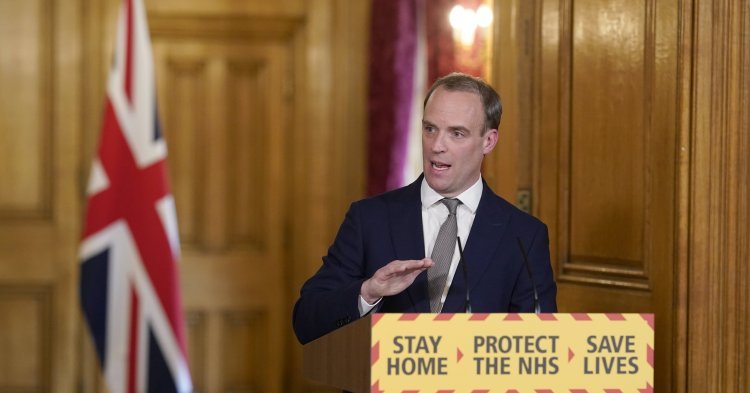This piece is decidedly not about the virus, or even about specific policy responses. It’s about the impact of those responses – regardless of how early they were implemented and how far they went – on party fortunes around Europe. To make our findings more representative of the Old Continent, we have chosen countries as diverse as North Macedonia and Kosovo in the Balkans to Poland in Central Europe to France and the UK in Western Europe.
There is another more important difference between these countries: Poland and the two Balkan countries woke up to the urgency of the crisis much earlier than France and (especially) the UK. While London lost weeks on its flirtation with “herd immunity”, Skopje and Pristina have been keeping their citizens inside for weeks, with 13-hour full-scale curfews from late afternoon until early morning.
And yet, all five countries tell pretty much the same story: COVID-19 is good for governments. We’ll leave it to academics to figure out how causal this correlation might be – or whether the effect is likely to endure. But for now, incumbents across the continent are rubbing their hands.
United Kingdom
These are strange times for British party politics. Boris Johnson’s decisive victory in the 2019 General Election put an end to three years of a hung parliament. January 31st saw the UK leave the European Union after 47 years of membership. The Labour Party’s electoral fiasco spelled the end of Jeremy Corbyn’s leadership, plunging the party into an endless succession marathon the outcome of which – Kier Starmer’s victory – was all but certain. After years of political civil war, Westminster has become a strangely predictable arena.
Not even COVID-19 has managed to drastically disrupt this predictability. Party politics has, thus far, played a secondary role in the crisis, particularly when compared to other countries. Labour’s leadership contest meant the main opposition spent weeks without a clear spokesperson. For a few days, Boris Johnson’s hospitalization signaled a change in tone: there was little room (and little appetite) for party political points on either side of the house. It seemed, in other words, that it had taken a pandemic for consensus to return to British politics.
This does not mean, of course, that political disagreements have not emerged. And recent revelations that Boris Johnson’ missed five Cobra meetings in February have accentuated this. The government’s Coronavirus Bill has been labelled ‘the biggest expansion in executive power we’ve seen in our lifetime’, its ‘herd immunity’ strategy was widely criticized, and concerns have arisen over PPE supplies. As the pandemic progresses, it may well be necessary for the government – currently led by the Foreign Secretary– to adopt starker measures. Although the number of Brits demanding such action is steadily increasing, they are unlikely to please everyone – and with Parliament shut down, may raise questions about executive accountability.
It remains to be seen which tone Keir Starmer’s Labour Party adopts, and how he strikes the right balance between solid opposition and national unity during a time of crisis. Yet unless something goes dramatically wrong, the Tories’ 80-seat parliamentary majority means coronavirus is unlikely to have any enduring effect on British party politics. For the time being, all is quiet on the Westminster front.
France
France was the first country in Europe to report cases of coronavirus. It was then believed that the virus was “imported” by non-French citizens who travelled back from China. In the meanwhile, the country has become an epicentre of the pandemic, despite repeated assertions from the government – and especially from the then health minister Agnès Buzyn – that a pandemic could not break out on the French soil.
Therefore, one might think that the government’s response to the crisis has been tentative, if not totally out of touch with reality. The first round of the local elections was held on March 16th – which turned out to be a defeat for President Macron’s party – whereas the President announced beforehand that schools and universities would be closed for an indefinite time. Finally, Macron and his prime minister Edouard Philippe eventually implemented a lockdown, postponing indefinitely the second round of the elections.
However, this mismanagement has not penalized the French “executive couple” for now. According to the newest poll ordered by the newspaper L’Express, 46% of respondents approved Macron’s presidency, up from 33% in the previous poll. Edouard Philippe’s popularity amounted to 43%, a rise of 7 points. Health minister Olivier Véran seems to be the “winner” and is now one of the most trusted politicians in France. However, the government’s action towards this crisis is still regarded with scepticism, only 32% of respondents to the aforementioned poll trusted Philippe’s government’s strategy. Thus, the consequences in terms of popularity are mixed.
Surprisingly though, populist parties have not taken benefit from the government’s hesitation. The Marine Le Pen-led Rassemblement National is not gaining popularity whereas Le Pen even shrinks in the last polls. According to the economic newspaper Les Echos, her aggressive rhetoric against Macron and Philippe does not pay off. But populists could gain ground if the health crisis leads to severe economic and social consequences.
Poland
Seeing our European friends - predominantly in Italy - fighting the desperate battle against the pandemic, made the Polish people and government want to act. Poland was in a slightly better position, since when borders were closed, there were only 100 cases in the country.
Since then, the government has spent most of the time saying how their response was quicker than the Italians’, Germans’, Spaniards’ and the French. As indecent as it is to use this horrifying time to claim to be better than one’s closest allies, it is very characteristic of the PiS (Prawo i Sprawiedliwość - Law and Justice) nationalist, right-wing government.
For the first weeks of the lockdown, the measures appeared appropriate and the government appeared focused on managing the situation. Problems started, when everyone realised that presidential elections were supposed to take place on the 10th of May. By law, elections can only be postponed if one of the ‘extraordinary laws’ is passed, such as martial law, ‘exceptional law’ or natural disaster law.
The problem is, the incumbent president Andrzej Duda apparently has the best chance to win, if the election is held on time - in the middle of a worldwide pandemic. In Polish politics, occupying the presidency and the lower house of parliament guarantees power - which is why PiS is desperate to hold onto them (especially after losing the Senate in a surprising twist last fall).
On the 6th of April, a bill was passed in order to let everyone vote by postal ballots. It sparked outrage, with voices being heard that PiS does not respect postal workers’ lives. For a brief moment, there was even a chance of the ruling coalition falling apart, when one of their partners claimed keeping the 10th of May date is impossible. But now (even though much can change in a month) Poland seems to be headed for an election very easy to rig.
When one might expect the time of a pandemic to be a moment of unity in fighting the threat, in Poland it became an attempt at a power grab. It is more subtle and less direct than in Hungary, but nobody can be certain how will it end. With social distancing protocols in place, there is even no option of protesting or trying to have a normal political debate - and this is the main reason why it is all so dangerous.
Meanwhile, 57% of Poles are against holding an election during COVID-19. If PiS is so proud of its tough and early crisis response, it will be hard pressed to answer how holding an election fits into it.
Kosovo
Kosovo’s government, amidst the COVID-19 pandemic, was ousted at the end of March after the majority of its parliament voted in favor of a no-confidence motion against Prime Minister Albin Kurti’s ruling Vetevendosje party, leaving the political situation of Europe’s youngest state in disarray.
The overthrow came after Kurti’s dismissal of Interior Minister Agim Veliu, who is the deputy minister of the political party LDK (Democratic League of Kosovo), which entered a coalition with Vetevendosje to form a new government after elections last year containing a series of agreements between the two parties.
Veliu’s sacking occurred as a result of a discord between Kurti and Kosovo’s president, Hashim Thaci, after Thaci proposed to implement a state of emergency. Kurti explained that Veliu had been dismissed for having “undermined the work of the government” and causing “unnecessary panic” after making statements to the media which contradicted official government positions on the pandemic.
On March 25, Kosovo’s assembly convened to vote on the no-confidence motion proposed by LDK’s leader, Isa Mustafa, where members of his party and Thaci’s party, PDK (Democratic Party of Kosovo), who entered a coalition with other opposition parties, voted for the dissolvement of Kurti’s government.
Citizens of Kosovo responded to the political turmoil by organizing protests from their balconies, at 20:00 each night expressing their dissatisfaction with their government’s handling of the pandemic, caring more about political power rather than the people’s well-being. In the past six days, Vetevendosje reported that over 4,000 people have joined the party, with recent polls in Kosovo held by media outlets showing waves of support for Kurti’s party after the dissolution of his coalition government.
North Macedonia
Just like France, North Macedonia’s government has followed basic common sense and entrusted the management of this health crisis to – the health minister. Stepping up as the public face of the crisis response, with daily press conferences on the number of cases and new policy measures, Minister Venko Filipce’s approval rating has skyrocketed to 82%. In fact, North Macedonia is the perfect illustration of COVID-19’s formidable power to change minds: less than a month before the crisis, one poll identified Filipce as the second most unpopular minister in his government.
It is difficult to tell whether this boost in popularity is “justified”. While North Macedonia was very quick to ban public gatherings and close its schools and shopping malls, the country boasts a second-highest percentage of cases in the Balkans. However, this unfavorable status is partly due to the region’s second-highest rate of COVID-19 testing, which inflates the case total, but also helps curb the epidemic.
Either way, it is yet to be seen whether the ruling party will emerge out of COVID-19 stronger. Originally scheduled for April 12, parliamentary elections have been postponed indefinitely. If the government does gain ground, however, it might not be due to COVID-19: in a rare piece of good news, North Macedonia received a green light from the European Council two weeks ago on the opening of accession talks.
The Light at the End of the Tunnel?
From London to Pristina, people are increasingly rallying around their leaders. This might be out of pity for their personal and political misfortunes (Kosovo and the UK) or out of genuine fear. As George W. Bush’s post-9/11 approval rating of 92% can remind us, people hold on to the status quo when they are anxious.
This doesn’t bode well for the opposition. These are difficult days for Labour: even the most constructive criticism against Boris will now be painted as insensitive. But it’s also a bad time to be Marine Le Pen – and that’s a good thing. Crises make us yearn for stability, but they also prompt us to reject fantasy – much to the chagrin of populists all around Europe (in Sweden, the far-right Sweden Democrats have taken the biggest hit in the ratings). It looks like there is a silver lining to everything – even to COVID-19.





Follow the comments: |
|
